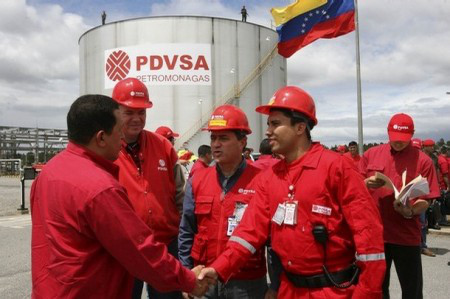By Michael Roh
When it rains it pours. In Venezuela’s case, when it doesn’t rain, the country with over 60% of its domestic electricity produced by hydropower, inevitably suffers. But the country that once experienced great fortune with its oil riches has already been suffering. With or without the rain, poor economic policy, along with poor energy policy, brings Venezuela to its current crisis. The drought is a convenient scapegoat.

Venezuela, a member of the Organization for Petroleum Exporting Countries (OPEC) has, as other oil-rich countries do, depended on oil revenues to sustain its state-run economy, with oil accounting for a staggering 95% of its export earnings. The country is a prime example of the resource curse, and why the state should refrain from politicizing oil companies. Former President Hugo Chávez and his successor, Nicolas Máduro, demonstrated just how disastrous for the economy excessive state meddling can be. The state-run Petróleos de Venezuela, S.A. (PDVSA), is one of the largest oil companies in the world, and suffered under governmental overstep. Chávez used oil exports as a foreign policy tool, selling oil at a discount to Venezuela’s allies (members of the Petrocaribe Alliance and the Bolivarian Alliance of the Americas), while using its oil revenues to pay off debts to China. Furthermore, PDVSA was used to fund ambitious economic policies to provide social services to the poor. Any good that Chávez achieved in his efforts to redistribute wealth (a drop in the poverty level from 50 percent to 30 percent from 1998 to 2012) were effectively negated under Máduro, with a 2015 study finding that 76 percent of the population lives in poverty. All the while, the manufacturing sector and agricultural sector have suffered due to the prioritization of the oil sector, and overregulation.
The country has taken extreme measures to cope with its dire economic situation, shortages in food and medicine, and massive inflation. Meanwhile, the lack of domestic energy supplies is forcing the government to take even more extreme measures to limit energy consumption, cutting work weeks to two days, setting clocks a half hour ahead to reduce early evening electricity consumption, and introducing power cuts for four hours a day.
The blame can be traced to poor economic policy, which created a flood of black market U.S. dollars, resulting in triple-digit inflation and a dramatic decrease in production, prompting Venezuela to take desperate measures. Venezuela manipulated its currency exchange, resulting in a dramatic difference between the government’s imposed rate for everyday goods and the black market rate. Inevitably, many Venezuelan importers were incentivized to profit from the subsidies, by selling the dollars they received on the black market, rather than selling goods. Currently the official exchange rate is 10 bolivars to 1 USD. But the black market exchange rate is at roughly 1115 bolivars to 1 USD. All the while, Máduro (who has only accelerated the economic crisis) boasts that the government has increased the minimum wage to 13.50 USD (per month, not hour) in response to the massive inflation. But Máduro must be held accountable for worsening Chavez’s naïve approach of dictating prices. This is the root of Venezuela’s problems. Shortages in supplies of essentials like food and medicine could have been prevented if the market, the interplay of supply and demand, was allowed to determine prices. This is how you help the poor, not by arbitrarily dictating prices.
Of course, the severe drought brought on by El Nino is severely limiting electricity production in a country that relies heavily on hydroelectric dams for its domestic electricity consumption. Low oil prices (hovering around 40 USD per barrel) have only added fuel to the fire. But these problems existed long before the oil price dropped, or the drought. The economic crisis is not a result of the energy crisis.
Energy security for Venezuela may take on a new meaning, beyond what it means for producer states (security of demand). Venezuela is confronting this reality, and the people are outraged with Máduro. Regionally, countries that depend on Venezuela for their energy imports could use this opportunity to diversify their supply sources and energy mix, perhaps switch to alternative fuels, even cleaner fuels. The region cannot depend on Venezuela for stable supply, if these countries wish for growth and investment. Venezuela’s current crisis may have a silver lining, as in an opportunity for neighbors who are import-dependent on Venezuelan oil to rethink their energy import strategy. It also serves as a reminder to policymakers that overregulation, disregard for the markets, and poor management of the energy sector, is a recipe for economic disaster, and everything else that comes with it, i.e. violent dissent and violent crackdown on dissent.

